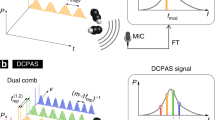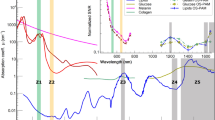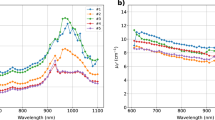Abstract
Bell, Tyndall and Röntgen all knew that gases and vapours absorb infra-red rays and that they would produce sounds if a stream of rays was interrupted at sonic frequencies. The mechanism of this phenomenon is as follows. When a gas absorbs infra-red rays, it is heated and its pressure increases. If the stream of radiation is interrupted at sonic frequency, there are rapid changes of pressure in the gas. Pulsation takes place, which is nothing more nor less than sound. The pitch of the sound depends on the frequency at which the rays are interrupted, and its strength on the ability of the gas to absorb infra-red rays. If pure air, in which there are no extraneous gases or vapours, is submitted to interrupted irradiation with infra-red rays, there will be no sound, since oxygen and nitrogen, of which the air is composed, do not absorb infra-red rays. If the rays are passed through a mixture of air and a gas or vapour, the sound produced will be louder the greater the quantity of extraneous matter present in the air.
This is a preview of subscription content, access via your institution
Access options
Subscribe to this journal
Receive 51 print issues and online access
$199.00 per year
only $3.90 per issue
Buy this article
- Purchase on Springer Link
- Instant access to full article PDF
Prices may be subject to local taxes which are calculated during checkout
Similar content being viewed by others
Author information
Authors and Affiliations
Rights and permissions
About this article
Cite this article
VENGEROV, M. An Optical-Acoustic Method of Gas Analysis. Nature 158, 28–29 (1946). https://doi.org/10.1038/158028c0
Issue Date:
DOI: https://doi.org/10.1038/158028c0
This article is cited by
-
Recent developments in photoacoustic imaging and sensing for nondestructive testing and evaluation
Visual Computing for Industry, Biomedicine, and Art (2021)
Comments
By submitting a comment you agree to abide by our Terms and Community Guidelines. If you find something abusive or that does not comply with our terms or guidelines please flag it as inappropriate.



